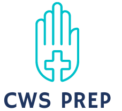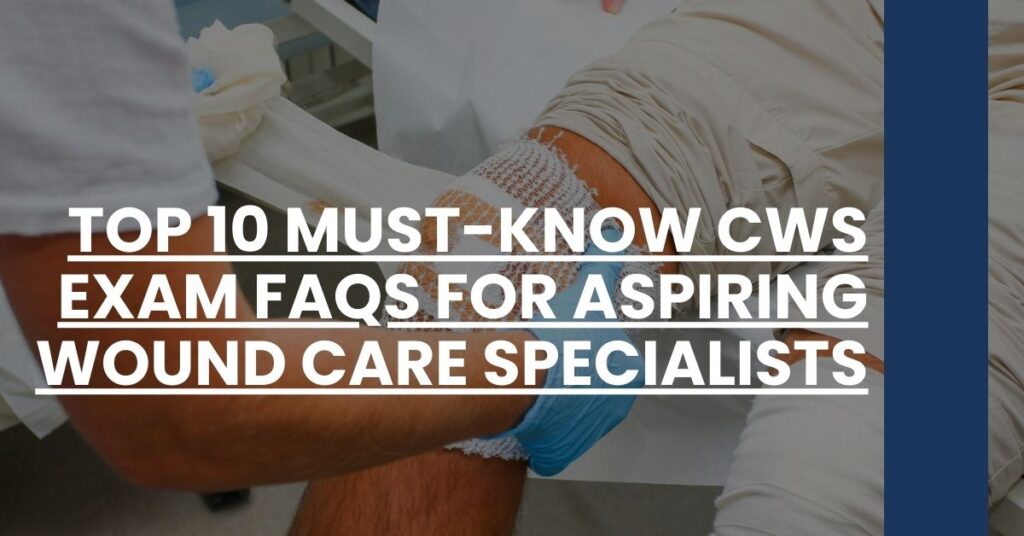Are you aiming to become a go-to expert in wound care? The CWS exam FAQs are your roadmap to certification success!
In this article, we distill the essentials: from eligibility to exam content, preparation to passing scores. Discover the foundations for acing the Certified Wound Specialist exam and advancing your career in wound care management.
- 1. What Is the CWS Certification?
- 2. Who Is Eligible for the CWS Exam?
- 3. What Does the CWS Exam Cover?
- 4. How to Register for the CWS Exam?
- 5. What Should You Expect on Test Day?
- 6. Understanding the CWS Exam Scoring System
- 7. Strategies for Studying for the CWS Exam
- 8. Retaking the CWS Exam: Guidelines and Tips
- 9. The Process of CWS Certification Renewal
- 10. Addressing Common Concerns with CWS Recertification
- Preparing Your Application for the CWS Initial Exam
- Conclusion: Wrapping Up Your CWS Exam Journey
1. What Is the CWS Certification?
If you’re delving into the complex and rewarding realm of wound care, the Certified Wound Specialist (CWS) certification is a beacon of proficiency and commitment. Endorsed by the American Board of Wound Management (ABWM), this certification signals to employers, colleagues, and patients that you possess a thorough understanding of wound management principles.
Not only does it underline your dedication to advancing patient care, but it also reflects adherence to stringent standards that affirm your expertise in this niche field. Think of the CWS certification as a tangible testament to your ability to devise and implement comprehensive wound management programs, a crucial need in the healthcare landscape.
As the healthcare industry continues to evolve, specialized certifications like CWS become increasingly vital. They not only boost your professional credibility but also ensure that you’re equipped with the most current knowledge and practices in your field. The CWS certification is not just an accolade—it’s an essential tool for shaping your career in wound care.
2. Who Is Eligible for the CWS Exam?
The journey to becoming a Certified Wound Specialist starts with checking if you meet the criteria. It’s essential, as the exam welcomes a select cohort of healthcare professionals committed to improving wound care outcomes.
- Current Licensure: You must have an unrestricted professional license in a healthcare field where wound management is in your scope of practice (such as physicians, registered nurses, or physical therapists).
- Educational Background: A bachelor’s degree or higher from an accredited institution is necessary, though exceptions are available for those with an associate degree and three years of clinical wound care experience.
- Professional Experience: Three years of clinical wound care experience or a completion of a wound care education program accredited by the ABWM Foundation is required.
These requirements aren’t just bureaucratic checkboxes; they ensure that CWS candidates have a solid foundation of knowledge and practice in wound care, making the certification meaningful and respected throughout the healthcare community.
3. What Does the CWS Exam Cover?
Navigating the content of the CWS exam can feel daunting. Structurally, it’s rigorous and comprehensive, spotlighting the need for a multifaceted understanding of wound care.
Here’s what you can expect to encounter:
- Anatomy and Physiology: Detailed knowledge of the structures and functions relevant to wound care.
- Wound Healing Principles: Understanding the complex processes that affect wound healing.
- Wound Types and Assessment: Recognition of various wound types and the nuances involved in their assessment.
- Treatment Modalities: Insight into contemporary methods and interventions that promote healing.
The CWS exam fosters a holistic approach, ensuring that candidates are prepared to handle the complexities of wound care, right from diagnosis to treatment and beyond. Authentic mastery in this sector hinges on an expansive insight across these topics, all of which are integral to the ABWM’s robust testing.
4. How to Register for the CWS Exam?
When you’re ready to take the plunge into certification, the registration process for the CWS exam is a critical juncture. Bearing in mind deadlines and fees is quintessential. Here’s a condensed guide to keep you on track:
- Verify Eligibility: Confirm you meet all the qualifications.
- Compile Documentation: Prepare necessary documents such as your professional license and educational transcripts.
- Complete Application: Fill out the application through the ABWM’s official website.
- Submit Fees: Pay the applicable examination fee as outlined by ABWM.
Once your application is reviewed and approved, you’ll receive a notification allowing you to schedule your exam at a local testing center. Be meticulous with your registration to avoid the forfeiture of your application fees.
5. What Should You Expect on Test Day?
The day you sit for the CWS exam is one where preparedness is key. Here’s what to keep in mind:
- Arrival Time: Ensuring punctuality gives you ample time to get settled.
- Identification: Bring the required identification specified by the testing center.
- Materials: Know what you’re allowed to take into the exam room.
The CWS exam isn’t just a measure of your wound care knowledge—it’s also a test of your ability to apply that knowledge effectively. The test format is designed to evaluate your critical thinking and problem-solving skills within a specified duration. Walking into the testing center with a clear understanding of what the day entails can set the stage for a smooth and successful exam experience.
6. Understanding the CWS Exam Scoring System
Understanding how your efforts will be measured can go a long way in easing your mind as you prepare for the CWS exam. The scoring system might seem abstruse at first, but here’s how it’s broken down:
- Criterion-Referenced: Each question has a set standard; your answer is evaluated against that yardstick.
- Passing Score: The threshold for passing is predetermined, and you’ll need to meet or exceed that mark.
- Score Report: You’ll receive an instant score report via your online account right after the exam, allowing you to gauge your performance immediately.
It’s not just about knowing the material; it’s about demonstrating that knowledge proficiently. With a criterion-referenced scoring system, your score reflects not just what you know, but the depth of understanding you’ve achieved. This form of assessment ensures that everyone taking the exam is held to the same high standards—essential for a certification as critical as the CWS.
7. Strategies for Studying for the CWS Exam
As you approach the CWS exam, structured and strategic preparation is non-negotiable. You’re not just facing an exam; you’re tackling a comprehensive evaluation of your wound care expertise. Here are valuable strategies to ensure your study time is as effective as possible:
- Create a Study Schedule: Design a plan that allocates time for each subject area, ensuring you cover all material without cramming.
- Utilize Study Guides: Access comprehensive CWS study materials that are tailored specifically for the exam.
- Practice with Old Exams: Get ahold of previous exam questions to familiarize yourself with the format and focus of the test.
- Form a Study Group: Collaborate with your peers to deepen your understanding and add an element of group learning to your prep.
Remember, the best preparation takes discipline and deliberation. You’re working to not only pass an exam but also to cement knowledge that will enhance your professional practice.
8. Retaking the CWS Exam: Guidelines and Tips
In the event that you don’t pass the CWS exam on your first attempt, don’t be disheartened. It’s not the end of the journey, but rather an opportunity to reassess and strengthen your knowledge. Here’s how you can approach the retake:
- Reflect on your Performance: Consider which areas were most challenging and plan targeted study strategies.
- Revise the Study Plan: Adjust your study techniques based on your prior experience and feedback.
- Seek Additional Resources: Engage in more dynamic forms of learning, such as seminars or workshops.
- Stay Positive and focused. Confidence can be as critical as competence when you’re looking to conquer the CWS exam.
Approaching a retake with a constructive mindset allows you to turn previous pitfalls into platforms for learning and growth.
9. The Process of CWS Certification Renewal
The CWS certification isn’t a culmination—it’s a commitment to continuous growth and learning in the field of wound care. To maintain your Certified Wound Specialist status, meeting the ABWM’s recertification requirements is key. Here’s a brief on what that process entails:
- Continuing Education: Complete a specific number of continuing education hours related to wound management.
- Submission of Documentation: Provide proof of your ongoing educational efforts and professional practice.
- Recertification Fee: Fulfill the payment of your recertification fee to maintain active status.
This commitment to ongoing professional development ensures that your skills and knowledge remain at the forefront of wound care.
10. Addressing Common Concerns with CWS Recertification
As your CWS certification matures, so must your dedication to excellence in wound care. Let’s tackle some common concerns regarding recertification:
- Time Frame: You’ll need to recertify before your 10th-year anniversary. The recertification guide details specific timelines and procedures to help you plan accordingly.
- Education Credits: Determine the best methods to accumulate your required education credits, whether it’s through conferences, seminars, or online courses.
- Exam Preparation: If retesting is on your horizon, revisit your study resources and strategies early on.
Treat recertification as an opportunity to reaffirm your dedication to your specialty and enhance your professional capabilities.
Preparing Your Application for the CWS Initial Exam
Before you can take your first step towards CWS certification, you need to successfully navigate the application process. Ensure that all details are accurate and all required documents are included. Here are a few tips:
- Details Matter: Double-check your application for completeness and accuracy.
- Supporting Documents: Gather all the necessary documentation, from transcripts to proof of licensure, in advance.
- Plan Ahead: Submitting early can help avoid any last-minute issues or delays.
Launching your journey with a well-prepared application sets the stage for success throughout the certification process.
Conclusion: Wrapping Up Your CWS Exam Journey
Preparing for and attaining your CWS certification is a testament to your professional dedication and a stepping stone to advanced practice in wound care. It’s more than passing an exam; it’s about demonstrating your commitment to excellence and patient outcomes in a specialized and ever-evolving field. Take pride in your pursuit, use these CWS exam FAQs to guide you, and embrace the certification journey as both a challenge and an opportunity. The success you achieve through certification is not merely for your own advancement—it’s a contribution to the elevation of the entire field of wound care.
CWS exam FAQs addressed: Get answers to eligibility, preparation, and scoring for the Certified Wound Specialist certification process.

